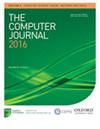基于局域递减引力模型的复杂网络中影响力传播者识别与排序
IF 1.5
4区 计算机科学
Q4 COMPUTER SCIENCE, HARDWARE & ARCHITECTURE
引用次数: 0
摘要
摘要复杂网络中关键节点的识别问题近年来受到越来越多的关注。一些经典的方法,如度中心性、中间中心性和接近中心性,各有优缺点。近年来,重力模型被用于描述复杂网络中节点之间的关系。然而,重力模型中的相互作用力遵循距离平方定律,与实际情况不一致。大多数人通常会受到周围人的影响,这意味着应该强调当地的影响。为了解决这个问题,我们提出了一种通过最大化节点的局部影响来降低局部重力中心性的索引方法。在该方法中,重新定义了重力模型的质量和半径,以表示节点的扩散能力。此外,还增加了一个递减权值,以增强节点的局部影响。为了评估该方法的性能,我们使用了四种不同类型的网络,包括交互网络、经济网络、协作网络和动物社会网络。此外,两种不同的传染病模型,易感-感染-恢复(SIR)和易感-暴露-低风险-高风险-恢复(SELHR),被用来检查影响节点的传播能力。本文章由计算机程序翻译,如有差异,请以英文原文为准。
Identifying and Ranking Influential Spreaders in Complex Networks by Localized Decreasing Gravity Model
Abstract Identifying crucial nodes in complex networks is paid more attention in recent years. Some classical methods, such as degree centrality, betweenness centrality and closeness centrality, have their advantages and disadvantages. Recently, the gravity model is applied to describe the relationship of nodes in a complex network. However, the interaction force in gravity model follows the square law of distance, which is inconsistent with the actual situation. Most people are generally affected by those who are surrounding them, which means that local influence should be emphasized. To address this issue, we propose an indexing method called localized decreasing gravity centrality by maximizing the local influence of a node. In the proposed measure, the mass and radius of gravity model are redefined, which can represent the spreading ability of the node. In addition, a decreasing weight is added to strengthen the local influence of a node. To evaluate the performance of the proposed method, we utilize four different types of networks, including interaction networks, economic networks, collaboration networks and animal social networks. Also, two different infectious disease models, susceptible-infectious-recovered (SIR) and susceptible-exposed-low risk-high risk-recovered (SELHR), are utilized to examine the spreading ability of influential nodes.
求助全文
通过发布文献求助,成功后即可免费获取论文全文。
去求助
来源期刊

Computer Journal
工程技术-计算机:软件工程
CiteScore
3.60
自引率
7.10%
发文量
164
审稿时长
4.8 months
期刊介绍:
The Computer Journal is one of the longest-established journals serving all branches of the academic computer science community. It is currently published in four sections.
 求助内容:
求助内容: 应助结果提醒方式:
应助结果提醒方式:


